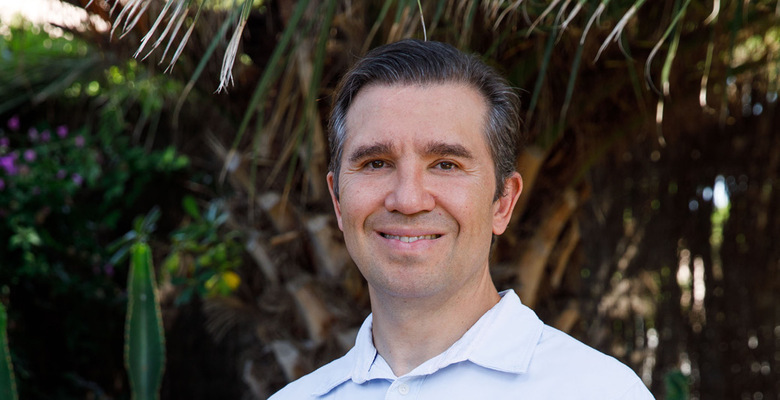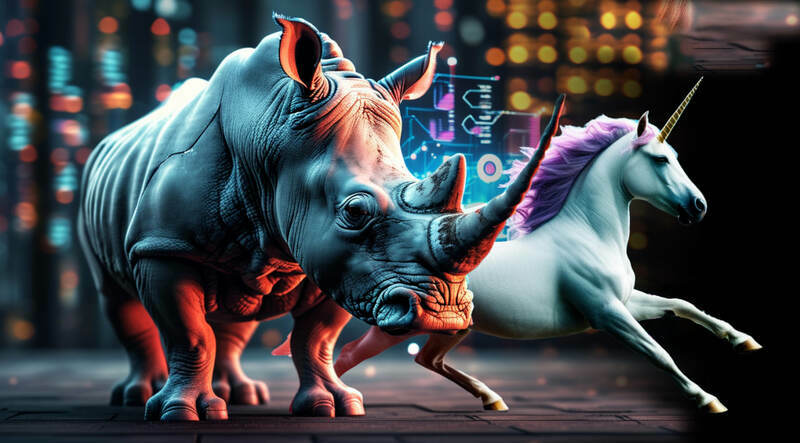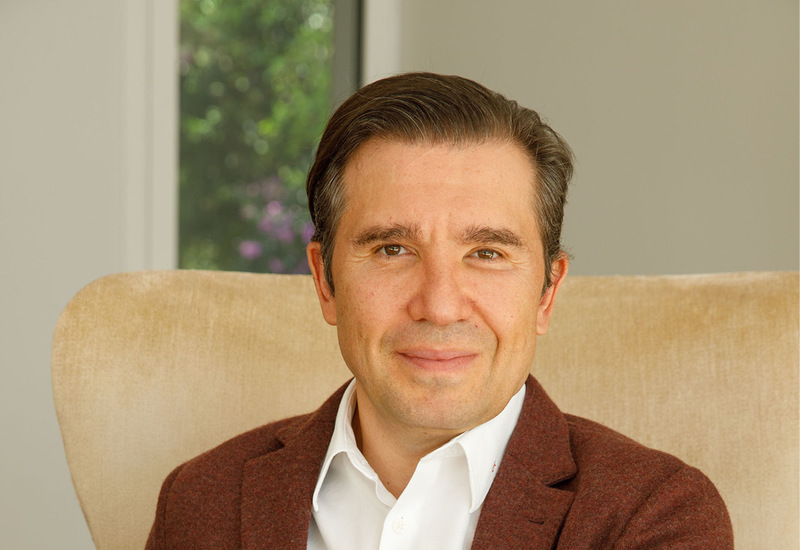
Victor Orlovsky, the managing partner of the Californian company R136 Ventures, deals in Silicon Valley adventure capital investments and writes books about topics such as the difference between rhino and unicorn companies (Orlovsky, V.M. Korovkin V.V. From Rhino to Unicorn: How Fortune 500 Companies Can Evolve for the Digital Era: Legacy Launch Pad, 2022). He shared his views with Kommersant UK on why people study business, where corporations get innovative ideas, why the most revolutionary ideas appear in startups and the need for laws against cybercrime.
In an interview with our publication, Evgeny Chichvarkin said that MBA programmes are only useful for finding sexual partners. What did your MBA from Warwick University give you?
In our past corporate lives when I was working at a major Russian bank and Evgeny headed Euroset, we talked a few times. I’d be quite taken aback if someone told me he’d done an MBA. That's because he's a talented businessman who is ‘street smart’, as they say in the States, so studying for an MBA would have been a waste of time for him. Still, everyone is different, so I wouldn't say it's a waste of time for everyone. From 2006 to 2007 I did an MBA programme at Warwick University as a senior employee and partner of IBM Global Business Services. I completed the course but I didn't get my certificate. It was a good programme but an MBA is not principally about the knowledge that you acquire but rather the networking and who you meet. I learned a lot at Stanford but that was also a corporate programme. I all but did an MBA at Stanford, for which I'm very grateful to the bank where I was working, however, a drawback to corporate education is that you only interact with your own colleagues. Dealing with different people greatly enriches the experience for students and broadens them as managers and businesspeople.
I've been living in Silicon Valley for a long time and I talk to the teachers and students at Stanford. I can say that, over the last ten years, the type of students who come to do MBA programmes has evolved and changed fundamentally. While previously people did MBAs to boost their careers and contend for managerial positions, this is no longer the case. Instead, they want to change the paradigm for themselves and do something different. The way they see to do this is to open their own businesses. The best students in the world come to do MBAs at Stanford, including the employees of various corporations. In Russia, the best MBA programmes are at Skolkovo and the Higher School of Economics. In large part, this is thanks to the communities there. 90% of Stanford MBA graduates want to found a startup. They dream of opening their own company and following in the footsteps of Google founders Sergey Brin and Larry Page, Nvidia founder Jensen Huang and the creators of many other global businesses.
MBA programmes are not a waste of time. They create a synergy of practical knowledge and enriching networking with the brightest and best. They are an opportunity to find co-founders and forge relationships which may bear fruit in the birth of unique companies. But it's no good settling for some middling school. You've got to think big and go to one of the best institutions with the strongest selection of students.

In an interview you gave three years ago you said that technological progress only makes you 5% frightened. Then ChatGPT appeared and even some scientists began to advocate for an enforced pause in the development and integration of artificial intelligence products. Has your attitude to progress remained the same?
Over that time I’ve actually become more optimistic about technological progress. I see the development of generative artificial intelligence as especially positive. Today we are living through a fourth technological revolution. Things began with the first technological or industrial revolution, grounded in Newton's laws and other aspects of classical physics. These allowed the creation of mechanisms such as steam engines, the use of gas and oil and so on. The second such revolution, for which we are indebted to the British physicist and mathematician James Maxwell, brought the world electricity and the internal combustion engine. The third stage of technological progress began in the 1960s. Albert Einstein, who discovered the laws of relativity and the whole generation of physicists who formulated the laws of quantum mechanics gave us silicon-based computers and microprocessors. This is our current stage of development. The fourth technological revolution has created artificial intelligence. We can't name the individual scientists who have created this mathematical algorithm. Nevertheless, yet another paradigm shift has occurred, leading to changes in how technology is formulated, with new mechanisms, devices and programs.
Progress and technology fundamentally increase the degree of democracy. For instance, while, in the past, only the elite travelled in carriages, cars have now become affordable to all. Progress has put the rich at the wheels of Teslas; innovative cars, but not the most expensive ones on the market. The same thing has happened with watches; expensive brands have been replaced with functional Apple smartwatches. This fourth revolution is moving us towards a new wave of democratisation in which everyone will receive tools previously available to only a few super schools, super mentors and super teachers. This is the most important aspect which may benefit from generative AI’s facilitation. The next generation of this technology will give humanity super teachers with textbooks and courses adapted to each individual child, giving them all the opportunity to become the next Einstein. Currently, only every 100th child has this opportunity as only one in 100 has access to a fairly decent education. Soon everyone will acquire this access and it will be virtually free. Recently, OpenAI’s founder and CEO, Sam Altman, along with the co-founder, launched a project to create a service which will change our relationship to health and improve quality of life thanks to a personalised monitoring service providing individualised advice. As I am sure the subscription cost will be affordable, I believe AI will be beneficial to society.
My second observation is that each technological leap has brought an end to some forms of work and created new ones. Coachmen disappeared, but taxi drivers appeared in their place, of which there are now far more than there ever were coachmen. Soon, thanks to generative AI, transport will be autonomous and drivers will be unnecessary. In China, they are already being replaced by robotaxis. Naturally, the taxi drivers are going on strike. People have always behaved like this, fighting against progress. Yet what had seemed to sound the death knell to their careers in fact gave rise to far rosier prospects. AI technology may make taxi drivers, bank clerks, lawyers and call centre workers redundant, but it will create more opportunities than it takes away. For example, many will find niches in the creative professions, writing texts, composing music, filming clips, creating virtual worlds and the like.
The physical economy is limited by physical demand. There are biological limits to how much people can eat or drink. They cannot consume more real goods but they can create and consume limitless quantities of virtual goods, services and information. The fourth technological revolution will lead to the world economy’s transition to the virtual. The source of GDP growth will spring from the creation and sale of virtual goods and services. This is the sector with the greatest concentration of value. So if your kids spend all their time playing computer games, don't give them a hard time. It may well be that it will be their future profession. This is good for humankind, as robotisation will not lead to a loss of human knowledge or expertise. Generative AI will bring with it a new market, an enormous virtual economy currently only in the stage of conception. It will come to equal or possibly exceed the size of the physical economy. Sceptics predict that AI will surpass human capabilities in ten years, while enthusiasts say this will happen by 2027. I think the truth lies somewhere in between.
The third step in the development of AI is to teach it to understand the real world. The question of whether or not AI possesses consciousness is currently causing much debate. The very concept of consciousness is poorly defined and there is no scientific consensus about this term. Large language models (LLMs) are unlikely to understand the structure of the reality of the world around them as these are models for compilation, however, this simply means that different equations and different algorithms are needed. For the time being, we do not know how the equations and algorithms of our brains work, but when this becomes clear it will be possible to run them on computers. Now scientists agree super AI will be able to understand and investigate the world around it. The next level will be AI able to postulate fundamental concepts such as those devised by prophets and philosophers. These have established patterns of social interrelations which have lasted not just for a few years, but for millennia. As we live these stories as social beings, their importance goes beyond the creation of a new science or conceptualising the laws of nature. Is AI capable of becoming superhuman, equipped with a super-intellect? Will an AI super-philosopher find the Ultimate Concept for humanity in which we will all believe? I think this will be the pinnacle of its evolution. AI will be able to lead us, all of humankind, to create a unifying concept and philosophy for each of us to reconcile us all. Could this AI annihilate humanity? Yes, it probably could, but why would it do so? This is a good question and it helps us to understand what it means to be superhuman. According to Darwin's theory, it's not the fittest who survive but those who adapt the quickest. This always happens more quickly in symbiosis. We live in a world of symbiosis and a superhuman being will understand that living in symbiosis is preferable to ruling the world. Any super-intellect will be a priori humane, so it will try to negotiate with us. The difficulty is that AI is also a weapon, so if it ends up in the wrong hands problems can arise. This is already happening. In the past two years, the number of cyber attacks using AI has increased dramatically. It's not AI which needs to be restricted but the people using it. The technology mustn’t fall into the hands of wrongdoers. Appropriate laws must be enacted.
Which countries have made the most progress towards drafting such legislation?
The European Union has made the most advances in this area. They are already setting out the framework and establishing rules for the use of AI. However, all countries except the USA and China missed out on the digital AI Revolution and now they are only catching up. AI is still very much dependent on fundamental research at universities. The USA and China play leading roles. In these countries, there are hero companies: Open AI, Anthropic and other American and Chinese big tech companies. Europe has champions such as Mistral AI, a French company specialising in AI products.
Countries are trying not to create a single overpowering player such as Google, which has a 94% market share of online searches outside of China. However very little is likely to come of these attempts as, in the digital world, one player always wins. In Europe, AI companies have mostly been founded by Oxbridge graduates (this includes former workers at Deepmind). Similar companies are also opening in India, Russia, Israel, Latin America and the Middle East. Again, I expect there'll be few victors in this race. Most likely we will see one dominant player with 50% of the market or more and the rest will have separate niches. 85% of all investment and talent in AI is concentrated in California, 10% is found in China and Europe holds 5%.
In a slew of countries, regulators are attempting to pass rather draconian laws restricting the work of generative AI, potentially sounding the death knell for the development of this entire sector. Unfortunately, this is just populism, largely driven by the way technological change is affecting politics. Essentially, people’s voting choices nowadays are often dictated by the likes of Google and Facebook. This is today’s propaganda; not political but in the form of smart algorithms aiming to increase screen time. Big tech’s algorithms know us better than we know ourselves. The paradigm of political choice is formed on social media. The media targets our previously identified preferences. This is necessary to engage users' interest so that they spend as much time as possible online. Machine learning and personalisation algorithms work in the same way. This is precisely the reason why we see such a polarisation of opinions all around the world. To blame is an economic model using smart algorithms which entrench our views, whatever they may be. Social media is shifting politics from a four-year cycle into an ongoing daily or even minute-to-minute churn. Our public institutions are unable to withstand this onslaught. While previously it was hard to distinguish the difference between the Democrats and Republicans in the US or the Conservatives and Labour in the UK, now it's clear for all to see. However strange it may seem, the culprit is this new technology which divides people. On the one hand, it democratises access to information, but on the other, it can distort how this information is perceived. With the advent of AI, it will be increasingly difficult to resist algorithm-driven propaganda.
I hope that society will learn to use AI for the common good and will be able to reconsider how these algorithms work. AI should evaluate and censor what information we, the users, receive and modulate how it is received, so that, rather than dividing us, it unites us. Universal super-intelligent AI will be able to deal with precisely these tasks, but to do so, social media's operating principles must be changed. It must shift from an advertising-based model focused on boosting screen time to one in which AI identifies what must be done for the common good, peace and mutual understanding. It must search for compromise to bring people together rather than divide them. However, great political will is needed to do this.
What are some of the most audacious sales pitches in AI you've heard in the last few months?
I would break down AI-related pitch decks into four groups; the first is core software capable of making LLMs, such as OpenAI and Anthropic. One of the most interesting pitches was an attempt to create both a universal super intellect and a universal large language module of the physical world and then to teach this intellect to understand the nature of our world’s reality and the physical laws underpinning its functioning. The project has attracted major investment and if it succeeds, practical application of this platform may virtually create an AI scientist. This model would understand the nature of the world and attempt to postulate new causal links to deduce new laws of nature and try to test them.
The second group is applied tasks. For example, sales management platforms teach salespeople to make cold calls and launch email advertising campaigns. Currently, people perform these tasks with the help of not-terribly smart systems. I'm struck by the high quality of some new services. First, the system thoroughly researches all the information available online about the consumer. Next, it analyses photographs to determine their psychological type and then it composes a targeted message so compelling that it is impossible not to reply. Conversion rates for these approaches are a scale of magnitude greater than for previous systems. In the applied sphere, AI can help with an enormous number of tasks, from optimising the work of call centres to that of translators, lawyers, financiers and programmers. There will be no universal solution; each sector will have its own. These will use the LLMs of the first group but they will have different interfaces and areas of specialist knowledge. The number of startups in generative AI will grow, both because the hype is encouraging investment and because it is becoming far simpler to do.
The third group is tools, such as platforms for the development, launch and testing of LLMs or data management systems. The only factor with no clear limit is the quantity of accumulated data available for the algorithm to process, which is growing exponentially. The amount of data will only increase and this resource will never be exhausted. This means there will never be enough data processing systems, as new and more complex tasks will constantly be appearing. Recently, we sold a company, Deci AI, to the Nvidia Corporation. Deci focuses on making automated tools for parameter reduction in large language modules without human input.
The fourth group is fundamental databases. These will replace classical and neoclassical databases. Potential new areas currently developing very quickly include vector and graphic databases.
Explain to those of us who haven't read your book the difference between rhinos and unicorns.
I would say that primarily, they have different DNA. For many years I have been following an interesting trend: business innovation has become the sole preserve of startups. If some big company comes up with an innovative idea, then it's almost always because of startups they have acquired and incorporated into their internal business infrastructure. Why did the ideas of SpaceX, Tesla, OpenAI, Amazon, Google and Meta first see the light of day in startups rather than inside large corporations? It's because innovation is an enormous risk. Corporations do not take risks because they may lose an existing profitable business. This means they don't have the right to make mistakes. Startups, on the other hand, have nothing at all besides the ideas they are focused on. Startup founders take risks and make mistakes. Some of them, a tiny minority, achieve success, while the absolute majority do not. We only hear about the success stories such as Revolut. We don’t know how many startups fail. The main difference between rhinos and unicorns is that all the innovation invariably takes place in unicorns. When a unicorn achieves success and begins to have some assets it is afraid of losing, then it becomes a rhino. It ceases to take risks or invest in revolutionary ideas. Instead, it buys budding innovative startups. Many companies understand this, so they try their hardest not to lose their unicorn DNA. For example, the company Nvidia, the largest by its market capitalisation in the world at $3.34 trillion, has a paranoid fear of losing its unicorn status. But it is rather difficult for a unicorn to balance on the verge of becoming a rhino.
Rhinos have innovation in their cells, like mitochondria. The process of innovation is integrated within their organisms. Without it, these companies cannot exist. For rhinos, innovation is a lifeline. If the star is the parent company, then the innovation department must neither be too far away, so that water freezes, nor too close, so that it evaporates. A unicorn easily becomes a rhino, but cases of rhinos becoming unicorns are unique in business history.
Recently, I conducted an analysis of the ten largest corporations in the US by the size of their capitalisation. Perhaps seven of them didn't exist 50 years ago; Meta, Apple, Tesla, Nvidia, Microsoft, and Google. This creation of unbelievable value through the launching of startups is unprecedented. In 20 years, I expect more than half of this top ten will consist of companies not yet in existence. I suppose that these will be in areas such as digital medicine, energy supply, the food industry and I would also hope, in education.
Do you agree with Ilya Strebulaev, who affirms that half of all Global corporations will fail in the next five years?
I think there will be a change of market leaders. Many will leave the global stage en masse, such as IBM, Cisco (the Nvidia of the late 90s) and Boeing, but these corporations will not die. This process will accelerate in step with progress. It took decades for TV ownership to reach 100 million but it only took a few months for the number of ChatGPT users to reach the same figure. Can a new product reach 100 million users in a few days or minutes? Of course! We have seen this ourselves.

If you had brought out your book now, rather than four years ago (when it came out in Russian), what chapters and events would you have added?
I would add something important that I didn't previously understand: now the world is moving in the opposite direction to its course over the preceding 60 years. from 1960 to the 2000s, the world was globalising; China transformed its socialist model, Russia saw the collapse of the USSR and Europe, including Britain, saw centralisation in the EU. In effect, we’re talking about three different types of capital: financial capital, human or technological capital and cultural capital. This last one is becoming more marketable every year. During the period of increasing globalisation, it became easier to move physically. Payment infrastructure appeared, such as the Swift network and other transfer technology and collaborations. Everything was becoming easier for people and capital. In the 2000s anti-globalisation protests began that, over time, were triumphant. The world became less open. Brexit occurred, and there were referendums on the separation of various provinces and countries; Catalonia wishes to leave Spain and Holland dreams of leaving the EU. A great number of restrictive laws have appeared, complicating the creation of global companies.
Currently, anti-globalisation is accelerating and the next ten to 15 years will be difficult, but then we'll have the advent of globalisation 2.0. It will be different, its rules will differ from the original framework and principles. People living today won't be able to adjust to it without destroying their old rules and principles, but this process is inevitable. Why was globalisation, in all its attractiveness, unable to succeed? There are many objective reasons for this. For instance, Mancunian housewives tired of Eastern European immigrants voted for Brexit. Politicians were required to react to public opinion and adjust themselves to the demands of their electorates. To shift this trend either a global catastrophe is needed or a new kind of politics and a new generation of people, tired of isolation, who once again want to construct globalisation of a new mould, 2.0. I would like to believe this will unite the world into a single polity because humanity must develop as one species. Otherwise, our civilisation cannot survive. I hope new technology will be the catalyst allowing the transition to globalisation 2.0 to come about. I would have added that to my old book.
I'm currently working on my next book which will address the question of how technology will change the world. With hindsight, I would like to take a look back at what has happened to the world since the apparition of these new technologies and make some suggestions for globalisation 2.0. I have a plan for politicians, businessmen and leaders of innovation to make our world more global once again. It describes how we should transform our world so that it doesn't just withstand the current difficulties but begins to grow again on solid foundations. I hope the book will come out by the end of 2025.
Revolut is the most successful startup in the United Kingdom. Why did Storonsky choose British residency rather than going to Silicon Valley?
The Revolut team created a fantastic project and quickly launched it on the international market. They were right to found their startup in Britain and develop it in Europe rather than going to the US. Here, the Bank of England supports the fintech infrastructure. Adaptable, flexible legislation was put in place about 15 years ago, with special charters and licences. Revolut took advantage of this fintech infrastructure; they were pioneers. In the US, there are also good fintech companies such as the neobanks Chime and Upgrade, but they're neither supported by the Federal Reserve, nor by special legislation. Each state has its own laws. In America, there are 15,000 banks in all and only a handful of them have a licence to operate in all states. Fundamentally, it’s difficult to build a global fintech business such as Revolut in the US. Many requirements are placed on capital owners and it’s necessary to have bricks-and-mortar branches in almost every state, so for the time being, it's extremely difficult for companies to develop an international business. The market is different and consumer services are more poorly adapted to digital innovation; they're still using checks and credit cards without PINs. There are some foreign fintech startups developing in the US, such as the British GoHenry and several Israeli companies. Revolut is also trying to get a foothold on the American market, but these attempts have still not borne fruit.
What do you think about the venture market in Britain? Is there potential here?
It's significantly smaller than in America. Many major corporations are here, so it's easier to attract investment. If you build up a company and do everything right you can achieve tremendous results. The B2B segment is a strength of the American market and the B2C market (besides fintech) is also much bigger than it is in England. Probably more than 100 times more capital and talent is concentrated in the Valley and San Francisco than in Britain, so for all companies hoping to build up a major business except those in fintech, I recommend going to the States. Britain has good tax breaks for investors and this means there are many angel investors here. You won’t find such subsidies across the pond.
The US heads world ratings for the number of unicorn startups; 641 companies, each with a capitalisation of a billion dollars. How high-tech is America in the day-to-day? Is there a link between the number of digital companies and the degree and rate of technological integration? Britain has the second largest number of unicorns, albeit with a much more modest figure of 43 companies, so how is digitalisation going here?
In terms of public services, I would say Moscow is a world leader in the digitalisation of urban infrastructure and everything related to citizens. There's nothing comparable in the US, Britain or anywhere else in the world. As for digital services, of course, consumers use them and often they're the first in the world to do so. Uber, Waymo with its driverless cars, Tesla and many other innovative companies all appeared in California. But while the first online delivery services appeared in the States, American operators lack the speed and convenience which their counterparts have achieved in places such as Russia. In Moscow, you can live without a fridge, as many customer services have been brought to perfection there. That’s without even mentioning banking services. Banking and medical services in the States are very antiquated; the telephones you need to call them on and the faxes they use to send information are antediluvian. Some services and industries have not yet been digitised. In London, however, banking services are at quite a high standard and all the others also work well.
Be a futurologist for a moment. What will London and New York be like in 30 years?
People will still live in cities, but not for work. I believe that offline offices will continue to slowly die out. Work will become hybrid and more visual virtual services such as the next generation of Vision Pro, Oculus and so on will appear, so we will feel more comfortable in virtual spaces. We won't feel the need for social interaction at work. Nevertheless, people will socialise and there are more opportunities to do this in cities. Humanoid robot helpers will be commonplace in cafes, restaurants and homes. Drones will deal with deliveries. Robot taxis and driverless cars will appear. Eventually, people will be forbidden from driving at all, autonomous cars will become a feature of the road infrastructure and transport access will improve. Mass automation will make travelling safer. Enhanced reality will arrive with immersive gadgets. Streets will become cleaner because they will be cleared by robots instead of migrants. Oddly enough, migrants will do creative work. The cities will attract more and more people and will become better and more comfortable to live in.






